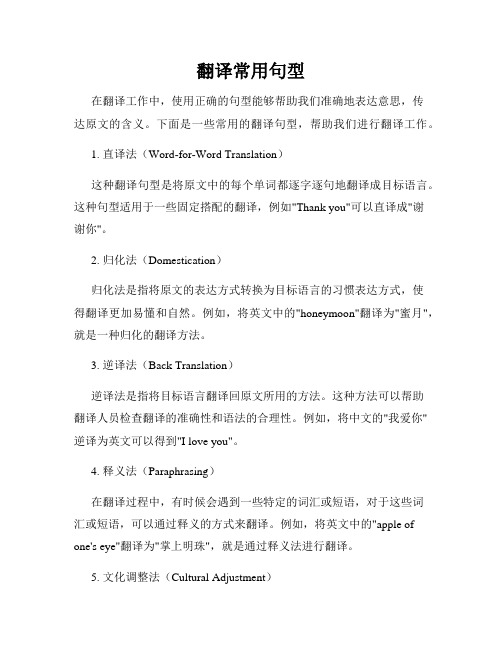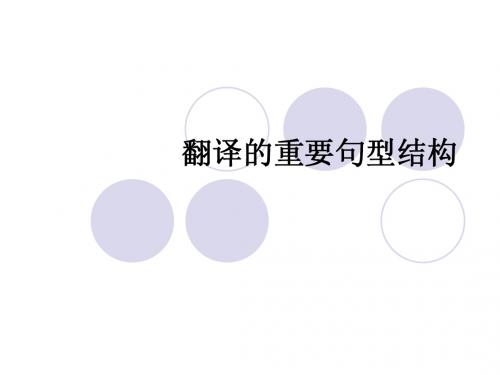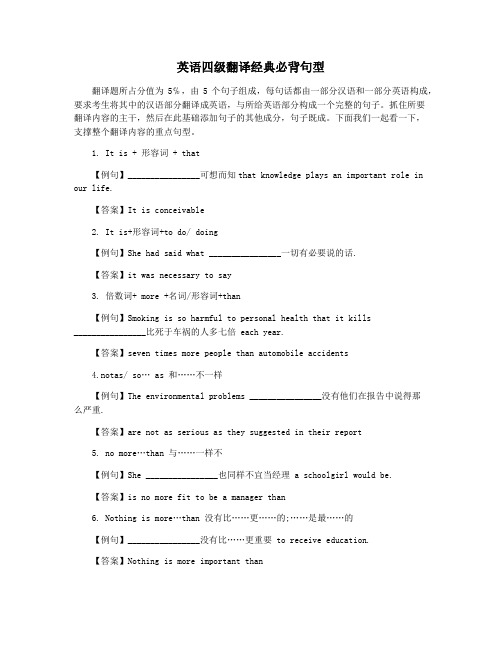翻译重点句型
英语翻译重点句型:9类虚拟句型

凯程考研集训营,为学生引路,为学员服务!第 1 页 共 1 页 英语翻译重点句型:9类虚拟句型 9类虚拟句型1、由wish 引起的表示愿望的虚拟语气The picture exhibition bored me to death; I wish I had not gone to it.---“I let Joe borrow our radio for the afternoon.”---“That ’s all right, but I wish he would buy one of his own.”I wish that he weren ’t so lazy.2、had hoped 引起的宾语从句中备用语动词形式为would+动词原形,表示一种过去未实现的愿望或令人失望的事。
His father had hoped that his son would go to business with him, but his son became an artist later.3、 would (had) rather, would as soon, would sooner 和would prefer 所引起的从句中要求用过去式表示当时或将来的情况,用过去完成时表示过去的情况,表示希望或婉转的责备。
例如:I would just as soon you had returned the book yesterday.我真希望你昨天把这本书还了。
4、It ’s (high, about) time that 句型中that 从句中要求用虚拟语气形式,即动词要用过去式。
It is high time that we put an end to this discussion.现在是我们该结束讲座的时候了。
5、as, 或者whether …or …谓语多用be 的原形,引导让步虚拟从句,这种用法通常采用倒装结构:Church as we use the word refers to all religious institutions, be they Christian, Islamivc, Buddhist, Jewish, and so on.The business of each day, be it selling goods or shipping them, went quite smoothly.6、由连接词in case, so that ,unless, lest ,for fear that 引起的状语从句中,谓语动词要用虚拟形式,即should(might, would)+动词原形,例如:She put a blanket over the baby for fear that he should catch cold.她在那个婴儿身上盖上了毯子以免他着凉。
英语翻译常用句型

翻译中常见的句型1.否定句型1)部分否定。
其否定意义只局限于整体中的一部分。
其形式:“概括词all, every等+not+谓语动词”。
常用于该句型词:all, both, everybody, everywhere, always,altogether, entirely, wholly等。
All is not gold that glitters.I do not wholly agree.2) 完全否定。
其形式:no, none 等否定词+肯定式谓语。
常用于该句型词:no, none, nobody, nothing, nowhere, never, neither, nowhere, nowise, 等。
还有一种句型:all等概括词+肯定式谓语+否定意义的词。
No words can describe the scene.任何言词均不能描绘那景色。
All his plan came to nothing.3)双重否定a.主语+cannot+ help/refrain/keep + from + v-ingHe could not help showing his pleasure.他不由得喜形于色。
b.主语+cannot+ but/choose but/ help but +doThey can not choose but admit that they are wrong.c.(there be) not +主语+but+谓语(There is )Nobody but has his faults. 人人都有缺点。
2.判断句型1)强调判断句a.主语+be+ no/none +other than/but +表语(强调内容)The tall figure that I saw was none other than our commander.b.主语+be+ nothing+(else)but/ else than/ less than+ 表语Genius is nothing but labor and diligence.天才只不过是劳动加勤奋而已。
英语翻译常用句型(加精)

英语翻译常考句型详解1.It is not that…but that… 这不是说…,而是说…「例文」It is not that the scales in the one case, and the balance in the other, differ in the principles of their construction or manner of working; but that the latter is much finer apparatus and of couse much more accurate in its measurement than the former.「译文」这并不是说在一种情况下所使用的磅秤和在另一种情况下所使用的天平在构造原理上或工作方式上存在差别,而是说与前者相比,后者是一种更精密得多的装置,因而在计量上必然更加准确。
2.nothing else than 完全是,实在是「例文」What the man said was nothing else than nonsense.「译文」那个人讲的话完全是一派胡言。
3.as引导的特殊状语从句,翻译时做定语从句处理。
「例文」We hope the measures to control prices, as they have been taken by the government, will succeed.「译文」我们希望,政府已经采取的控制物价的措施将取得成功。
4.名词+or+名词结构中,or后的名词是同位语,应译为即…;或者称….「例文」Moreover, technology includes techniques , or ways to do things , as well as the manchines that may or may not be necessary to apply them.「译文」再者,除机器外技术还包括技艺,即制作方法,而运用这些记忆并不一定都需要机器。
翻译常用句型

翻译常用句型在翻译工作中,使用正确的句型能够帮助我们准确地表达意思,传达原文的含义。
下面是一些常用的翻译句型,帮助我们进行翻译工作。
1. 直译法(Word-for-Word Translation)这种翻译句型是将原文中的每个单词都逐字逐句地翻译成目标语言。
这种句型适用于一些固定搭配的翻译,例如"Thank you"可以直译成"谢谢你"。
2. 归化法(Domestication)归化法是指将原文的表达方式转换为目标语言的习惯表达方式,使得翻译更加易懂和自然。
例如,将英文中的"honeymoon"翻译为"蜜月",就是一种归化的翻译方法。
3. 逆译法(Back Translation)逆译法是指将目标语言翻译回原文所用的方法。
这种方法可以帮助翻译人员检查翻译的准确性和语法的合理性。
例如,将中文的"我爱你"逆译为英文可以得到"I love you"。
4. 释义法(Paraphrasing)在翻译过程中,有时候会遇到一些特定的词汇或短语,对于这些词汇或短语,可以通过释义的方式来翻译。
例如,将英文中的"apple of one's eye"翻译为"掌上明珠",就是通过释义法进行翻译。
5. 文化调整法(Cultural Adjustment)在进行跨文化翻译时,有时候需要对原文进行文化上的调整,使得翻译更符合目标语言的文化习惯和价值观。
例如,将英文的"black cat"翻译为中文时,可以添加"瑞"或"吉"这样的字眼,因为在中国文化中,黑猫往往象征着好运。
6. 意译法(Free Translation)意译法是指在翻译过程中,将原文的意思进行合理转换,以使得翻译更符合目标语言的语法和表达习惯。
大学英语四级翻译常考句型

大学英语四级翻译常考句型1. …as soon as… 一……就……1 Peter一听到消息就兴奋地喊起来; As soon as Peter heard it, he cried out excitedly.2. as…as 和……一样& not as/ so…as ……不如……1听磁带和看英语电影一样重要;Listening to tapes is as important as watching English-language movies.3. as … as possible 尽可能地……1 当你感冒的时候,你应该喝尽可能多的水;When you have a cold, you should drink as much water as possible.4. ask sb for sth…… 向某人要……1 当你不知道问题的答案时,你可以向你的老师寻求帮助;When you don‘t know the answer to any questions, you can ask your teacher for help.5、ask/tell sb. how to do sth.请/告诉某人如何做……1 Tom的爸爸经常告诉Tom应该如何正确面对问题;Tom‘s father often tells Tom how to deal with the problems in the correct way.6. ask/tell sb. not to do sth. 请/告诉某人不做某事1 我妈妈经常告诉我不要花费太多时间玩电脑游戏;My mother often tells me not to spend so much time in playing computer games.7. be afraid of doing sth. / that+从句担心某事可能产生的后果1 学生们为考试担心不足为奇;It‘s no surprise that students are afraid of having exams.8. be afraid to do sth. 害怕去/不敢去做某事1 Peter害怕在别人面前说话; Peter is afraid to speak in front of other people.9. be busy doing sth./be busy with sth. 忙于做某事/忙于某事1他正忙着通过听磁带来学习英语; He is busy studying English by listening to tapes.11…为……准备/……迟到了/对……感到歉意1 我们已经准备好聚会了; We have got ready for the party.12 高兴……1你应该高兴,你能去欧洲;You should be glad you will travel to America..13、最……之一1 他是他们班最高的孩子之一; He is one of the tallest children in his class.2 纸是最有用的发明之一; Paper is one of the most useful inventions.3 故宫是北京最有名的风景名胜之一;The Palace Museum is one of the most famous places of interest in Beijing.推荐信息4北京是中国最大的城市之一; Beijing is one of the largest cities in China.5他是跑的最快的学生之一; He is one of the students who runs fastest.14带来/送给/寄给/借给/传递/告诉某人某事物1 请递给我那支笔; Please pass me that pen.3 到达美国后请立刻给我寄一封信; Please send me a letter as soon as you get toAmerica.4他给我带来一支玫瑰; He brought me a rose.5我借给他10元钱; I lent him 10yuan.15…或者……或者;不是……就是1 要么进来,要么出去; Either come in or go out.2 我想要去巴黎或伦敦; I want to visit either Paris or London.3 你喝茶也行,喝咖啡也行; You can have either tea or coffee.4 手机不仅能打电话,还能上网;The Mobile phone is used to either make a phone call or surf the Internet.5 不是他就是你喜欢蓝色;Either you or he likes blue.16喜爱/喜欢、讨厌做某事1 我喜欢集邮;I enjoy collecting stamps.2 我讨厌排队很长时间; I hate waiting for a long time.3 她喜欢在业余时间读书; She likes reading in her spare time.4他喜欢独处;He enjoys staying alone.5妈妈不喜欢坐飞机; Mum hates taking a plane.17 完成/介意/保持/继续做某事1 你写完作业了吗Have you finished doing your homework2 关上门你介意吗 Would you mind closing the door3 每日保持锻炼对你身体有好处;Keeping doing exercise is good for your health.4抱歉,让你久等了; I‘m sorry to keep you waiting so long.推荐信息18为……做好准备1 请为即将到来的考试做好准备;Please get ready the coming examination.2 伦敦已经做好了2012奥运会的准备; London has got ready for the 2012 OlympicGames.19最好不要做某事1 你最好别对老人大声嚷嚷; You‘d better not shout at the old man.20在某方面帮助某人1 她经常帮助妈妈做家务;She often helps her mum do the housework.2 请在英语方面帮助我; Please help me with my English.3 你能帮我擦黑板吗 Could you please help me clean the blackboard4 我认为帮别人做作业不是好事; I don‘t think it’s a good idea to help others do homework.5 他帮家长找到了那个迷路的孩子;He helped the parents find the lost boy.21. I don‘t think that+从句我想…不会…;我认为…不…1 我认为这不是学习英语最好的方法;I don‘t think that it’s the best way to learn English.2我认为没有电脑的生活是不完美的;I don‘t think that life is perfect推荐信息without computers.3 我认为你不应该撒谎; I don‘t think you should tell a lie.4 我认为在上课说话是不对的; I don‘t think it’s right to talk in class.5 我认为这件衣服并不漂亮; I don‘t think this clothes is very beautiful.22. I would like to do sth. 我想做…1我想让你帮帮我; I would like to let you give me a hand.23. It looks+形容词/ It sounds+形容词看上去…;听起来…1 看起来不错;It looks nice.2 听起来不错 It sounds good3 听起来很糟糕; It looks terrible.4 听起来像个不错的主意; It sounds like a good idea.5 你看起来像一个好人; You look like a good person.24. It‘s bad/ good for sb. to do sth. 做某事对某人有害/有益1 每天抽烟对你有害;It is bad for you to smoke every day.2 每天锻炼对你的健康有好处; It is good for your health to exercise every day.3 每天坚持说英语对你的英语学习有好处;It is good for your English study to keep speaking English every day.4 早睡早起有利健康;It‘s good for your health to go to bed early and get up early.5 不按时写英语作业对我们不好;It is bad for us to do English homework on time.25. It‘s a good idea to do sth. 去做某事是一个好主意;1 每天做大量的阅读是个好主意;It‘s a good idea to do lots of exercise.26. It‘s important for sb. to do sth.1 对他来说,学好英语很重要;It‘s important for him to learn English well.2 对每个人来说,保持健康很重要;It‘s important for everyone to keep healthy.3 每天吃大量的蔬菜是很重要的;It‘s very important to eat plenty o f vegetable.4 每天做大量的听力练习很重要的;It‘s very important to do lots of listening practice every day.5 能分辨是非是很重要的;It is very important to tell the difference between right and wrong.27. It‘s time for sth. ……的时间来了;该干……的时候了28. It‘s time for sb. to do sth. 是某人做……的时候了1是我们弹钢琴的时间了; It‘s time to play the piano.29. It‘s three metres long/high/wide. 它是三米长/高/宽30. It takes sb. some time to do sth. 做某事花费某人多长时间;1那道数学题真难,我花了1个小时的时间才做出来;The math exercise was so difficult that it took me an hour to work it out.32. keep sth.+形容词让…一直保持…/ make sth.+形容词使……怎么样1这可以让老师和学生都很高兴推荐信息This can make both the teacher and the students happy.33. look forward to doing sth.盼望做某事;1 我期待收到你的来信;I‘m looking forward to hearing from you.I‘m looking forward to your letter.34. make/let sb. not do sth. 使、让某人不做某事;1 谁把你弄哭啦Who makes you cry2 让我们去游泳吧;Let‘s go swimmin g.3 让我们去公园吧;Let‘s go to the park.4 妈妈让我尽快把屋子整理干净My mother made me clean the room as soon as possible.5 为了学好英语,老师总是让我们早晨大声朗读;In order to study English well, the teacher always makes us read aloud in the morning 35. neither…nor…既不……,也不……1老师和学生都不在教室;Neither the teacher nor the students are in the classroom.36. not… at all 根本不;一点也不1 我一点都不喜欢足球;I don‘t like football at all.2 这本书一点意思都没有;The book is not interesting at all.3 我一点也不想把笔记借给她;I don‘t want to lend the notebook to him at all.4 他根本不该再犯同样的错误;He shouldn‘t make the same mistake at all.5 他根本不知道怎么与别人相处;He doesn‘t know how to get on with others at all.37. not only…but also… 不但……而且……1不仅他想知道如何学好英语,我也想知道;Not only he but also I want to know how to study English well.38. not…until 直到……才1直到Miss Smith进来了,学生们才停止了说话;The students didn‘t stop talking until Miss Smith came .…,the other… 一个……,另一个……1Tom的父母都在中国,一个当老师,一个当医生;Tom‘s parents are in China. One is a teacher, the other is a doctor.40. some…, others… 一些……,另一些……1他给我们带来好多书;有的是告诉我们如何学习的,有的告诉我们保持健康的;He brought us lots of good books. Some tell us how to study, others tell us how to keep healthy.A toB 喜欢A胜过B1成千上万的孩子如今一边听流行音乐一边做作业,也不愿在安静的房间里做;Thousands of children nowadays prefer doing their homework to a background of pop-music to doing it in a quiet room./ hear sb. do sth. 看见/听见某人做某事1我们经常看到孩子们在警察的帮助下过马路;We often see the children cross the street with the help of the police.hear sb. doing sth. 看见听见某人在做某事1有人看见她从犯罪现场跑开;She was seen running away from the scene of the crime.2我们看见他们那时在打扫教室; We saw them cleaning the classroom at that time.…that… 如此…形容/副词…以致于……1学校太远了,男孩不能自己去; The school is so far that the boy can‘t get there by himself.45. such…that… 如此…名词…以致于……1学校太远了,男孩不能自己去; It‘s such a far school that the boy can’t get there by himself.46. spend …on sth./ in doing sth. 花费时间在…/花时间做……1别在那些没意义的事情上花如此多的时间;Don‘t spend so much time on thos e meaningless things.50. take sth. with sb. 随身带去某物; bring sth. with sb. 随身带来某物1你有必要每天随身携带一些钱;It‘s necessary for you to bring some money with you every day.2要下雨了;你最好随身带一把伞;It‘s going to rain. You had better take an umbrella with you.more…,the more… 越……;, 越……1你学的越多,你的成绩就越好;The more you learn, the better your score will be.2 你锻炼越多越健康; The more you exercise, the healthier you are.3 越多越好 The more, the better.52. There is something wrong with. ……;有了毛病1我的电脑一点毛病也没有; There is nothing wrong with my computer.…;to 太……而不能1这个老人太老了,不能自己照顾自己;The old man is too old to look after himself.to do 过去常常1 我弟过去个子不高,但是现在很高;My brother used to be short, but now he is tall.55. What about… How about………怎么样Why not do =Why don‘t you do 为什么不做……呢1 为什么不买个相机呢Why not buy a camera Why don‘t you buy a camera2 为什么不走59. Could you please do请你做……好吗 WillWould you please do着去呢Why not go on foot=Why don‘t you go on foot60. Would you like to do sth. 你想要做……吗1 我想喝杯咖啡; I would like to have a glass of coffee.。
翻译的重要句型结构

经典考题: 经典考题: Not until he had finished his mission ____________________________ (直到他完成使 命) did he realize that he was seriously ill.(2008. 6)
4. 虚拟语气:与过去事实相反 虚拟语气:
句型:从句中使用过去完成时,主句中由 would/should/could等 + have + 过去分词 例句:You wouldn’t have met her if it hadn’t been for me. I could have done better if I had been more careful.
经典考题: 经典考题: The more you explain, the more I get confused (我 _________________ 愈糊涂)(2006. 6) The more exercise you take, the________________________(你越不大可能 less likely you are to catch a cold 得感冒). (2009.12) Since my childhood I have found that to me, nothing is more interesting than reading ___________________________________________________. (没有 什么比读书更有吸引力) (2006. 12) It is said that those who are working overtime are are more likely to put on weight _____________________________________________________. (更有可能增加体重) (2009. 6)
英语四级翻译经典必背句型

英语四级翻译经典必背句型翻译题所占分值为5℅,由5个句子组成,每句话都由一部分汉语和一部分英语构成,要求考生将其中的汉语部分翻译成英语,与所给英语部分构成一个完整的句子。
抓住所要翻译内容的主干,然后在此基础添加句子的其他成分,句子既成。
下面我们一起看一下,支撑整个翻译内容的重点句型。
1. It is + 形容词 + that【例句】________________可想而知that knowledge plays an important role in our life.【答案】It is conceivable2. It is+形容词+to do/ doing【例句】She had said what ________________一切有必要说的话.【答案】it was necessary to say3. 倍数词+ more +名词/形容词+than【例句】Smoking is so harmful to personal health that it kills________________比死于车祸的人多七倍 each year.【答案】seven times more people than automobile accidents4.notas/ so… as 和……不一样【例句】The environmental problems ________________没有他们在报告中说得那么严重.【答案】are not as serious as they suggested in their report5. no more…than 与……一样不【例句】She ________________也同样不宜当经理 a schoolgirl would be.【答案】is no more fit to be a manager than6. Nothing is more…than 没有比……更……的;……是最……的【例句】________________没有比……更重要 to receive education.【答案】Nothing is more important than7. 感官动词+of+名词【例句】They hurriedly escaped into ________________充满恐怖气氛的山洞.【答案】a cave that smelt of terror8. without/ not so much as 甚至没有【例句】Disappointed with her husband,Mary left home ________________甚至都没有回头看他一眼.【答案】without so much as looking back at him9. only to find/ see 结果却;没想到会【例句】He spent almost all his money to buy the hen which was said to be able to lay goldeggs, ________________没想到这只鸡根本不会下蛋.【答案】only to find it could not lay eggs at all10. It is undoubted that/ There is no doubt that 毫无疑问,……【例句】________________毫无疑问 war can be avoided if we get down to peace talk.【答案】There is no doubt that11. rather than 而不是……【例句】________________与其追求金钱的享乐,we should focus on the improvement ofourselves.【答案】Rather than pursue money to achieve happiness12.Thechances are that 很可能……【例句】________________她很可能已经知道了, and there is no need for us to keep thesecret.【答案】Chances are that she has already known it13. It occurred to sb. that 突然想到……【例句】________________玛丽从来没有想到she would become a princess someday.【答案】It had never occurred to Marry14. not… but… 不是……而是……【例句】To our disappointment, ________________这个计划带来的不是进步而是破坏.【答案】the plan caused not development but destruction15. When it comes to… 提及,当提到……的时候【例句】________________谈到物理学, I know nothing.【答案】When it comes to physics16. be not much of a… 是个不太好的……【例句】________________迈克不是个好老师 for he often skips from one subject toanother.【答案】Mike is not much of a teacher感谢您的阅读,祝您生活愉快。
翻译常用句型

翻译常用句型1. How are you doing? 你好吗?2. Can you help me? 你能帮我吗?3. What's your name? 你叫什么名字?4. Where are you from? 你从哪里来?5. How old are you? 你多大了?6. Can I have a glass of water, please? 我可以来杯水吗?7. What time is it? 几点了?8. I love you. 我爱你。
9. Thank you. 谢谢你。
10. How much does it cost? 这个多少钱?11. Where is the restroom? 厕所在哪里?12. I'm sorry. 对不起。
13. Can you speak English? 你会说英语吗?14. Where can I find a taxi? 我在哪里可以找到出租车?15. What's the weather like today? 今天天气怎么样?16. I'm hungry. 我肚子饿了。
17. What's your favorite color? 你最喜欢的颜色是什么?18. How do you say this in English? 这个用英语怎么说?19. Where do you live? 你住在哪里?20. I don't understand. 我不明白。
21. Can you repeat that, please? 你能重复一遍吗?22. I'm tired. 我累了。
23. What's your occupation? 你的职业是什么?24. What's your favorite food? 你最喜欢的食物是什么?25. How was your day? 你今天过得怎么样?26. Can you recommend a good restaurant? 你能推荐一家好的餐厅吗?27. Where is the nearest bus stop? 最近的公交车站在哪里?28. Do you have any siblings? 你有兄弟姐妹吗?29. What's your phone number? 你的电话号码是多少?30. Can you lend me some money? 你能借我一些钱吗?31. What's your favorite movie? 你最喜欢的电影是什么?32. What's your favorite book? 你最喜欢的书是什么?33. How do you get to school? 你怎么去学校?34. What's your favorite sport? 你最喜欢的运动是什么?35. Can I have the bill, please? 能给我帐单吗?36. What's your favorite music genre? 你最喜欢的音乐类型是什么?37. How do you spell your name? 你的名字怎么拼?38. What's your favorite animal? 你最喜欢的动物是什么?39. Can I take a photo with you? 我可以和你合影吗?40. Where can I buy souvenirs? 我在哪里可以买纪念品?41. What's the capital of your country? 你的国家的首都是什么?42. Can you play a musical instrument? 你会弹奏乐器吗?43. What's your favorite hobby? 你最喜欢的爱好是什么?44. What's your favorite season? 你最喜欢的季节是什么?45. Can you teach me how to do that? 你能教我如何做吗?46. What's your favorite holiday? 你最喜欢的假期是什么?47. Can I try it on? 我可以试穿吗?48. What's your favorite song? 你最喜欢的歌曲是什么?49. How do you say "hello" in your language? 你的语言中怎么说“你好”?50. What's your favorite drink? 你最喜欢的饮料是什么?。
- 1、下载文档前请自行甄别文档内容的完整性,平台不提供额外的编辑、内容补充、找答案等附加服务。
- 2、"仅部分预览"的文档,不可在线预览部分如存在完整性等问题,可反馈申请退款(可完整预览的文档不适用该条件!)。
- 3、如文档侵犯您的权益,请联系客服反馈,我们会尽快为您处理(人工客服工作时间:9:00-18:30)。
重点句型1. 强调句 It was lightening that caused the forest fire last year.正是闪电引起了去年的那场火灾。
2. 虚拟语气We hurried back to school lest/ for fear that it (should) rain.我们匆匆忙忙地赶回学校,生怕天会下雨。
3. 比较级 The more time a person spends on his work,the less time he has to play.一个人花在工作上的时间越多,花在玩耍上的时间就越少。
This subject is far more difficult than everybody has previously expected.这门课程比每个人以前预料的还要难得多。
A political figure's success depends more on external factors than his own characteristics. 一个政治人物的成功与其取决于他个人的特点,不如说取决于外部因素。
4. 让步状语 Whether you believe him or not, you have to make the decision.无论你是否相信他,你都必须做出决定。
No matter how hard he tried,he couldn't persuade his friends to give up the adventure. 无论他怎么努力,都不能说服他的朋友们放弃冒险。
He decided to carry out the plan in spite of the protest from his parents.他决定不顾父母的反对执行他的计划。
7. 结果状语I broke my glasses so that I couldn't see clearly what happened.我打破了眼镜,以至于看不清当时发生了什么事。
The density of the star has become so great that it may explode at some time.这颗恒星的密度如此之大,以至于它会在某一时刻爆炸。
8. 非限定性定语从句 As we expected正如我们所预料的那样/As is well known众所周知, the project was finished successfully on time.项目成功地提前完成。
9. 形式主(宾)语 It's no doubt that correct decisions made today will have a good effect on future. 毫无疑问,今天做出的正确决策将对未来有很好的影响。
Many people find it important to keep a good living habit.很多人认为保持一个良好的生活习惯非常重要。
11. 宾语补足语 The new electronic techniques make possible the effect that has never been created before. 新的电子技术使得一种从未有过的音响效果成为可能。
12. 倒装句 Not until recently did we realize that language was closely related to culture. 直到最近我们才意识到语言与文化密切相关。
Under no circumstances should you hesitate to offer your opinion as it is.在任何情况下你都应毫不犹豫地说出你真实的想法。
13. 比较状语 Such people as you described can hardly succeed in nowadays. 像你描述的那种人在当今社会很难取得成功。
14. 原因状语Robots are different from automatic machines in that they can be reprogrammed to do another job.机器人和自动化机器的不同之处在于它能被重新编程完成其它的任务。
15. 宾语从句人们对于是否应该用动物做实验持不同的态度。
people hold different attitudes as to whether animals should be used in experiments.26. 并列句Sports can not only benefit our body, but also contribute immensely to mental health. 运动不仅对我们的身体有益,而且还极大地有助于精神健康。
一、the + ~ est + 名词+ (that) + 主词+ have ever + seen ( known/heard/had/read, etc) the most + 形容词+ 名词+ (that) + 主词+ have ever + seen ( known/heard/had/read, etc) 例句:Helen is the most beautiful girl that I have ever seen.海伦是我所看过最美丽的女孩。
Mr. Chang is the kindest teacher that I have ever had.张老师是我曾经遇到最仁慈的教师。
二、Nothing is + ~~~ er than to + VNothing is + more + 形容词+ than to + V例句:Nothing is more important than to receive education.没有比接受教育更重要的事。
三、~~~ cannot emphasize the importance of ~~~ too much.(再怎么强调...的重要性也不为过。
)例句:We cannot emphasize the importance of protecting our eyes too much.我们再怎么强调保护眼睛的重要性也不为过。
四、There is no denying that + S + V ...(不可否认的...)例句:There is no denying that the qualities of our living have gone from bad to worse.不可否认的,我们的生活品质已经每况愈下。
五、It is universally acknowledged that + 句子~~ (全世界都知道...)例句:It is universally acknowledged that trees are indispensable to us.全世界都知道树木对我们是不可或缺的。
六、There is no doubt that + 句子~~ (毫无疑问的...)例句:There is no doubt that our educational system leaves something to be desired.毫无疑问的我们的教育制度令人不满意。
七、An advantage of ~~~ is that + 句子(...的优点是...)例句:An advantage of using the solar energy is that it won't create (produce) any pollution. 使用太阳能的优点是它不会制造任何污染。
八、The reason why + 句子~~~ is that + 句子(...的原因是...)例句:The reason why we have to grow trees is that they can provide us with fresh air.The reason why we have to grow trees is that they can supply fresh air for us.我们必须种树的原因是它们能供应我们新鲜的空气。
九、So + 形容词+ be + 主词+ that + 句子(如此...以致于...)例句:So precious is time that we can't afford to waste it.时间是如此珍贵,我们经不起浪费它。
十、Adj + as + Subject(主词)+ be, S + V~~~ (虽然...)例句:Rich as our country is, the qualities of our living are by no means satisfactory.{by no means = in no way = on no account 一点也不}虽然我们的国家富有,我们的生活品质绝对令人不满意。
十一、The + ~er + S + V, ~~~ the + ~er + S + V ~~~The + more + Adj + S + V, ~~~ the + more + Adj + S + V ~~~(愈...愈...)例句:The harder you work, the more progress you make.你愈努力,你愈进步。
The more books we read, the more learned we become.我们书读愈多,我们愈有学问。
十二、By +Ving, ~~ can ~~ (借着...,..能够……例句:By taking exercise, we can always stay healthy.借着做运动,我们能够始终保持健康。
十三、~~~ enable + Object(受词)+ to + V (..使..能够..)例句:Listening to music enable us to feel relaxed.听音乐使我们能够感觉轻松。
十四、On no account can we + V ~~~ (我们绝对不能...)例句:On no account can we ignore the value of knowledge.我们绝对不能忽略知识的价值。
